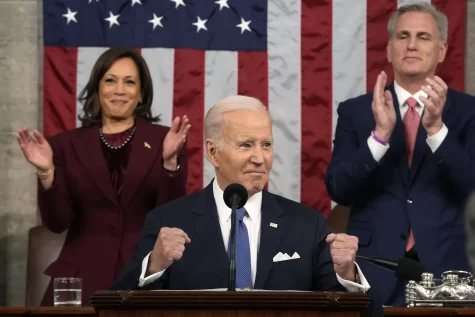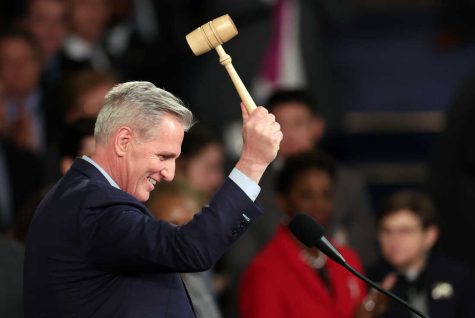AAUP, OU reach agreement to extend deadline as bargaining talks continue
Oakland University and the American Association of University Professors are still working on contract negotiations a day after the 2009 collective bargaining agreement was originally intended to expire.
The 2009 agreement, which was set to expire on Aug. 15, was extended by 48 hours as both sides continue bargaining.
According to the AAUP, the two sides were hopeful an agreement could have been reached before an extension was necessary.
“We were very hopeful that Mr. Boonin, an experienced and professional negotiator, would calculate the dollars, would weigh how far each side had moved and would make his final moves quickly and fairly to allow us to reach an agreement that would let both sides to come away from the table perhaps scratched and bruised yet able to preserve dignity and continue to work together,” said the AAUP in their bargaining diaries. “Unfortunately, after a long 10-hour day, nothing much was accomplished.”
OU was not available for comment.
The two sides remain divided on three key issues: tuition waivers, health insurance and pay raises.
Tuition waivers
The university has proposed cutting the faculty tuition waiver, which currently allows OU faculty and their immediate family to attend classes at Oakland free of charge.
“Forever the university has given faculty waivers for immediate family and self,” said AAUP President Karen Miller.
Faculty and their family members who used this tuition waiver could not be enrolled in classes unless there was an open spot and they where not taking a “chair” away from a paying student.
Miller said faculty were the ones whose workload was increased by the waiver, since teachers were not paid for teaching a student on a faculty waiver.
“Faculty members are bearing the brunt of these people,” Miller said. “(The) actual loss is negligible (for the university). (Their) cost is an extra handful of people every year in the OC (Oakland Center). The teachers don’t make extra money (by having a faculty members student in their class).”
With OU being in the lowest 17 percentile of the nation in faculty salary, Miller said department chairs used this tuition waiver as a way of attracting new faculty to the university.
“I received a letter from someone (that) said (they) took a $20,000 pay cut to come to this university because (they) had four kids to put through college and (they) wanted them to go to OU,” Miller said. “What do I tell them now?”
Besides attracting faculty to the school, Miller said tuition waivers create a sense of pride by allowing faculty members to send their kids to the school where they teach.
“To throw something like this on the table is such an insult,” Miller said.
Health insurance
The university has proposed to replace the teacher’s current health insurance plan with a performance-based plan.
Under a performance-based plan, individual’s insurance premiums are affected by their health, meaning those with health problems will pay more than those without.
“(There are a) number of very serious concerns that all faculty have about this (proposed) health insurance program,” Miller said.
Faculty, according to Miller, have one of the oldest median ages in the workforce. This is troubling for the AAUP because with age, it becomes harder to maintain good health, she said.
“Some of these plans have stricter (health) standards than Centers for Disease Control and Prevention do,” Miller said. “Three years ago when we looked into these plans, the majority of faculty did not meet (the standards).”
While the university has maintained that the move to a performance-based health plan is designed to keep faculty healthier, Miller has her concerns.
“(The) university says they want to motivate us to be healthier, but it will cost them much less money this way,” Miller said.
However, Miller indicated that the AAUP would not be against a performance-based health care plan.
“We are not unreasonable to where we won’t look at that,” Miller said. “We want people to be healthy. If we can come up with a performance-based health care plan that is affordable, we would consider it.”
Pay raises
Under the university’s initial economic proposal, all raises for faculty would be merit-based and given at the discretion of the university.
Miller said that this merit-based system “doesn’t make any sense in the context of a modern university.”
This merit-based system is, according to the AAUP, almost unheard of at a public university, but does exist in private and for-profit universities.
“(A switch to merit-based raises) will not only hurt the ability to recruit (new faculty), but also to maintain faculty,” Miller said.
Following the university’s proposal, the AAUP sent out notices of what the university had proposed to all of its members. Miller said that 10 percent of faculty responded in the first 10 hours after the notices where sent out. Half of the letters she got back said “we are not valued by the administration.”
“People were angry, people were hurt, people were aggrieved,” Miller said. “The financial offer came out and everyone thought it was 2009 again.”
The AAUP and Miller fear that if the university is able to make the switch to a merit-based system, there would be a “wave of resignations.”
About 20 percent of the letters Miller received from faculty following the university’s proposal said they “were back on the job market.”
Moving forward
OU and the AAUP called in a state mediator on Aug. 9, an in effort to help both sides find common ground.
“Calling in a mediator at this point isn’t a big step,” said AAUP Chief Negotiator Michael Latcha. “It’s just an effort to get more help to move towards an agreement.”
Miller said the mediator is helping both parties make progress on the negotiations.
“I am not sure forward momentum would be happening without her,” Miller said. “She has spent huge amounts of time with both teams.”
Both sides are hopeful that an agreement will be reached before the 48-hour extension on the 2009 agreement runs out.
“The university hopes that Thursday will be the last day needed to reach a tentative agreement, but in light of the association’s current table position, (we are) reluctant to express cautious optimism,” said the university’s bargaining diaries.











